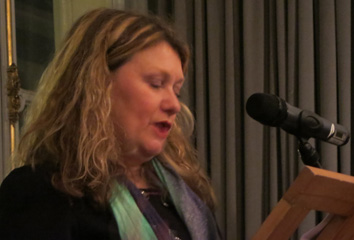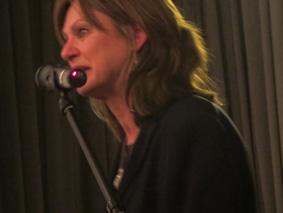 I had an interesting three days this last week, with Everyman at the National Theatre neatly sandwiched between a gig in which I was to be found playing the cornet as I marched down Kingsbridge Fore Street accompanying the townspeople as they danced the Floral Dance, and an open air performance of The Taming of the Shrew by Guildford Shakespeare Company. A
I had an interesting three days this last week, with Everyman at the National Theatre neatly sandwiched between a gig in which I was to be found playing the cornet as I marched down Kingsbridge Fore Street accompanying the townspeople as they danced the Floral Dance, and an open air performance of The Taming of the Shrew by Guildford Shakespeare Company. A ll three were hugely enjoyable, but this blog is about the National Theatre production of ‘Everyman’ on the middle evening. The play is based on the mediaeval morality play, updated with a script written by Carol Ann Duffy.
ll three were hugely enjoyable, but this blog is about the National Theatre production of ‘Everyman’ on the middle evening. The play is based on the mediaeval morality play, updated with a script written by Carol Ann Duffy.
Every now and then it is necessary to swallow my feminist ideals, and as this play is based on the mediaeval morality play that evolved many centuries before our awareness of the inequality that can be perpetuated by exclusive language, I won’t complain at the title. I’ll just point out that it’s a morality play about everyone, including women. (OK, that’s all I’ll say on this occasion!).
It is courageous to stage a straight morality play in the 21st century, and even though the programme suggests that it’s adapted for a secular age (whatever that is), the message of the play is old-fashioned religious, and at times probably reflects Carol Ann Duffy’s Roman Catholic upbringing. The story is of Everyman being visited by death at the end of his bacchanalian 40th birthday party, and told that he has to give an account of his life before God. Everyman tries various devices to get away from this horrible truth, and appeals, unsuccessfully, to friends, family and wealth to put in a good word for him.
It was a fast-moving, slick and satisfying performance. The wonderful actor, Chiwetel Ejiofor, was an appealing and convincing Everyman, well capable of representing us all. God who was played as an office cleaner by Kate Duchene, and Death (with an Irish accent) by Dermot Crowley, were both impressive. There were familiar songs such as ‘You’ll never walk alone’, Latin chant and plenty of contemporary music and dance, and the play starts with Everyman’s dramatic descent down from the roof to the pit. There was also some delicious humour.
If I had any minor criticisms they would be first that the dramatic first scene of the party, though brilliant in terms of cho reography, sound and visual effects, could have been cut a little: we really had got the message by half-way through the sequence; and occasionally we lost some vital words and therefore missed a joke or punchline. But all in all it was a wonderful evening, with fine dialogue, and exciting sound and visual effects, including a terrifyingly realistic tsunami.
reography, sound and visual effects, could have been cut a little: we really had got the message by half-way through the sequence; and occasionally we lost some vital words and therefore missed a joke or punchline. But all in all it was a wonderful evening, with fine dialogue, and exciting sound and visual effects, including a terrifyingly realistic tsunami.
The modern slant to the morality aspect took the form of an environmental emphasis, and as Everyman moves from mindless materialism to knowledge and humility, he also becomes aware of the way he has mistreated the planet, treating it as a coin to be tossed away. The message comes across strongly, and anyone watching the play must surely be reminded not only of the harm the planet has suffered through our ecocide, but also of our continuing complicity if we don’t work tirelessly to change the way human beings are squandering the earth’s resources and raping the planet that is our only home.
One of the pivotal points in Everyman’s journey occurs when he meets his younger self, Everyboy, and is told by him in no uncertain terms that he should remember to say thank you.
The final scene is probably the most moving. Everyman, having ended up being helped and instructed by a tramp (Knowledge) gains not only knowledge but also humility and gratitude, and comes to an understanding that he has a soul. I was reminded in the first case of T S Eliot’s ‘humility is endless’, and in the latter by the Ancient Mariner finding blessing when he became aware of beauty. Everyman’s paean of thankfulness was beautifully expressed, and covered all of his life and experience.
 God (still sweeping and cleaning) is heard to comment on how she still loves him, which is a religious message if ever there was one. But apart from that, the splendour of the performance and the strong environmental message, the play reflects in the cast and the production the rich diversity both of London, and of life.
God (still sweeping and cleaning) is heard to comment on how she still loves him, which is a religious message if ever there was one. But apart from that, the splendour of the performance and the strong environmental message, the play reflects in the cast and the production the rich diversity both of London, and of life.
This modern version of the mediaeval morality play may seem a surprising choice for the 21st century London stage, but it was skilfully adapted, beautifully acted, challenging in its message, and offers an extremely rich and satisfying evening.
Comments closed








 As well as festivals, there are many other opportunities for readings. I’ve read in a number of bookshops, at the launch of magazines and anthologies that include poems by me, the launch of my books, prizewinners’ events, as the entertainment at parties, and regular poetry events such as the Troubadour in London, the Uncut readings in Exeter and pub gigs such as Tradewinds on Dartmoor. Other great venues have been the Edinburgh Fringe, the Walpole Old Chapel in Suffolk, the Dower House at Morville Hall in Shropshire, Slimbridge and Leighton Moss bird reserves and at university venues. There’s also usually an opportunity to read after giving a workshop or judging a competition. If you’re looking for readings, the possibilities are endless..
As well as festivals, there are many other opportunities for readings. I’ve read in a number of bookshops, at the launch of magazines and anthologies that include poems by me, the launch of my books, prizewinners’ events, as the entertainment at parties, and regular poetry events such as the Troubadour in London, the Uncut readings in Exeter and pub gigs such as Tradewinds on Dartmoor. Other great venues have been the Edinburgh Fringe, the Walpole Old Chapel in Suffolk, the Dower House at Morville Hall in Shropshire, Slimbridge and Leighton Moss bird reserves and at university venues. There’s also usually an opportunity to read after giving a workshop or judging a competition. If you’re looking for readings, the possibilities are endless..